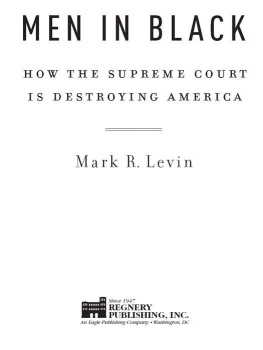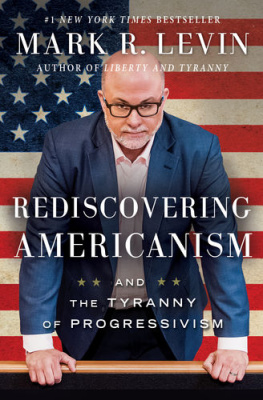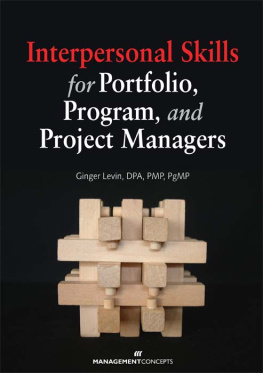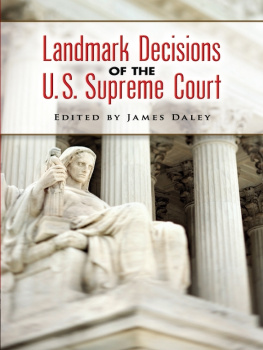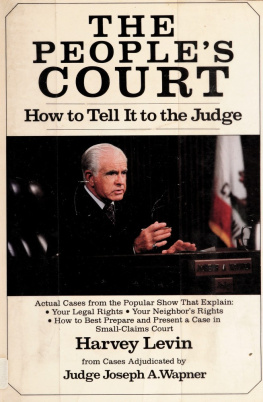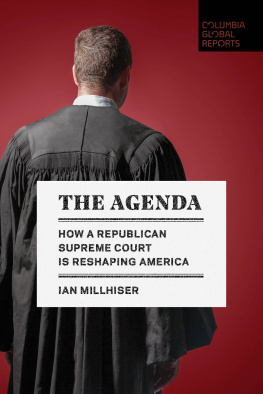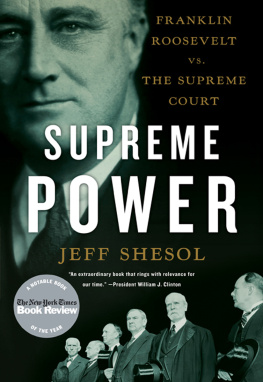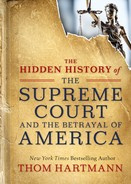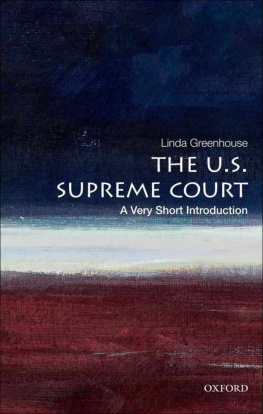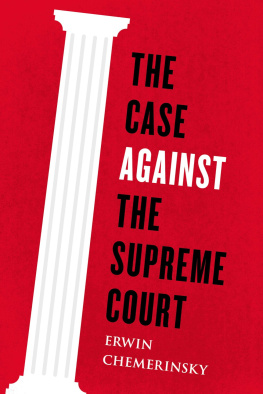MEN IN BLACK
HOW THE SUPREME COURT
IS DESTROYING AMERICA
Mark R. Levin

Copyright 2005 by Mark R. Levin
All rights reserved. No part of this publication may be reproduced or transmitted in any form or by any means electronic or mechanical, including photocopy, recording, or any information storage and retrieval system now known or to be invented, without permission in writing from the publisher, except by a reviewer who wishes to quote brief passages in connection with a review written for inclusion in a magazine, newspaper, or broadcast.
Library of Congress Cataloging-in-Publication Data
Levin, Mark (Mark Reed), 1957
Men in black: how the Supreme Court is destroying America / Mark Levin.
p. cm.
Includes bibliographical references and index.
ISBN: 978-1-59698-009-9
1. JudgesUnited StatesPopular works. 2. Judge-made lawUnited StatesPopular works. 3. Justice, Administration ofUnited StatesPopular works. I. Title.
KF8775.Z9L48 2004
347.7314dc22
2004026156
Published in the United States by
Regnery Publishing, Inc.
One Massachusetts Avenue, NW
Washington, DC 20001
www.regnery.com
Distributed to the trade by
National Book Network
Lanham, MD 20706
For the Levin family: my wife, Kendall; our children, Lauren and Chase; my parents, Norma and Jack; and my brothers, Doug and Rob.
C ONTENTS
F OREWORD TO THE P APERBACK E DITION
I wrote Men in Black to warn you, my fellow citizens, that our freedoms are at risk from judges who usurp the Constitution. I wanted to help spur a national debateas I do on my radio showover the Supreme Courts role, the judicial oligarchy that increasingly rules over us, and the sort of justices who should be appointed to the Court.
Since the hardcover edition of this book appeared, President George W. Bush has successfully appointed two outstanding individuals to the CourtChief Justice John Roberts and Associate Justice Samuel Alito. And I believe the public is now more aware of the dangers of liberal judicial activismand they want something done about it.
The problem, however, remains: judges still routinely usurp power from the other branches of government and act as though they are unconstrained by the Constitution. One recent case in particular underscores the spectacular arrogance and lawlessness of the Supreme Court.
Judicial Land Grab
Wilhelmina Dery had lived her entire life in a house in New London, Connecticut, that her family had owned for more than one hundred years. She was born in the house in 1918. Her husband, Charles Dery, moved in after they were married in 1946. Their son and his family lived next door (in a house that was the Derys wedding present). Then, a few years ago, the Derys were told that the city of New London had taken title to their homes by eminent domain and that they had to leave. Eminent domain involves the government condemning and taking private property for a public use.
One of the Derys neighbors, Susette Kelo, a registered nurse, found a notice of eviction on her house the day before Thanksgiving in 2000. Why was New London trying to evict them? Well, the city wanted to take their homes (claiming the neighborhood was blighted) and transfer them to private developers, purportedly to improve the area and generate more tax revenue. The Derys, Kelos, and other homeowners challenged the citys plan and placed their hopes in the Supreme Courtoften said to be our great guardian of civil liberties.
The case has become famous for what the Supreme Court failed to do. In Kelo v. City of New London , the Court gutted a part of the Bill of Rights called the takings clause of the Fifth Amendment.1 The Bill of Rights recognizes certain (albeit not all) important natural rights that we possess as human beings and seeks to ensure their protection. One of these rights is the right to own property. The takings clause provides that private property may not be taken for public use, without just compensation.2 Therefore, if the government takes your land to build a road or military base, it must properly compensate you.
In Kelo the issue became the meaning of public use. As has happened in so many areas of the law, the Supreme Court made seemingly small, subtle changes to the clear meaning of the words. Over time, this led to dramatic departures from the Constitutions original meaning. According to the Courts activists, public use really means public purpose. And the phrase public purpose means just about whatever any government wants it to mean. Five of the nine justices voted to diminish private property rights and expand the power of government beyond its constitutional limits.3
As Justice Clarence Thomas wrote in his dissent:
The Court has elsewhere recognized the overriding respect for the sanctity of the home that has been embedded in our traditions since the origins of the Republicwhen the issue iswhether the government may search a home. Yet today the Court tells us that we are not to second-guess the Citys considered judgmentswhen the issue is, instead, whether the government may take the infinitely more intrusive step of tearing down petitioners homes. Something has gone seriously awry with this Courts interpretation of the Constitution. Though citizens are safe from the government in their homes, the homes themselves are not. [Emphasis added]4
While the appointment of more justices who are faithful to the Constitutionlawyers call them originaliststo the Court is critical, the problem is that the judiciary has relentlessly expanded its power throughout our history to dictate national policy, especially since the 1930s. The judiciarys seizure of power has become institutionalized. And its the institution that must be addressed.
Is Criticism Forbidden?
The judicial activists who have exercised this enormous power resent any attempt to restrain their authority. They say its an assault on judicial independence and even on their personal safety. In a speech last year to appellate lawyers, then associate justice Sandra Day OConnor complained about former House majority leader Tom DeLay (although not by name), because he dared to make the point that judicial independence does not equal judicial supremacy. She said that death threats against judges have become increasingly common. (She then referred to Senator Jon Cornyn, again without naming him, because he had complained that judicial activism might contribute to public hostility.) And she said that the experience of developing countries, former Communist countries, and our own political culture teaches that we must be ever vigilant against those who would strong-arm the judiciary into adopting their preferred policies.5
The mere discussion of the Supreme Courts unconstitutional excesses evoked panic from OConnor, who conflated judicial independence with judicial supremacy, which helps explain both her years of activism on the Court and her disdain for the representative branches. OConnor drew no line where judicial independence ends and judicial supremacy (tyranny) begins.
I want to be clear. Threats against judges are absolutely deplorable, as are threats against any official in government. Those who make them should be prosecuted to the fullest extent of the law. But I reject OConnors effort to use these threats to bar debate about the judiciarys role and to intimidate those who think the judiciary is as worthy of discussion as anything else. I have no doubt that the president is threatened frequently. However, criticism of the president, his policies, his power, and everything else about him is robust, if not extreme. And nobody suggests that the debate and criticism have led to the threats on his life.

